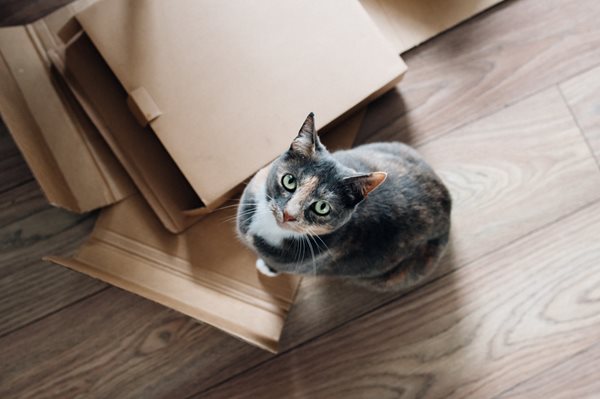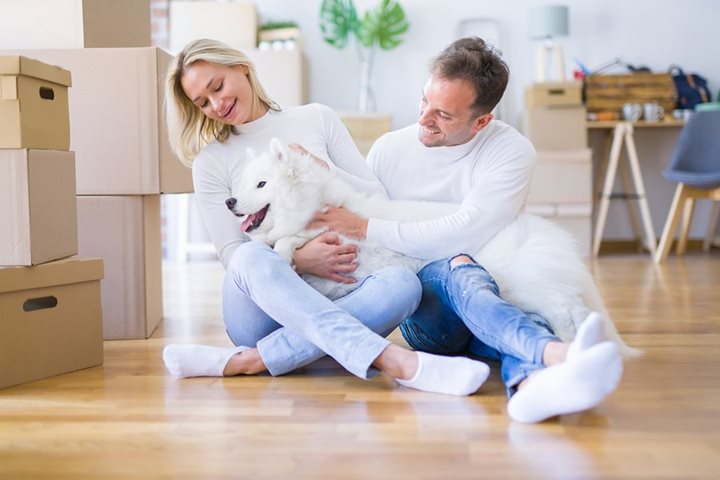Moving home takes enough organisation without thinking about what to do with your pets on moving day. But if moving is stressful for us, it’s definitely stressful for them - so it's worth doing a bit of organising to support our furry friends during the upheaval. Lots of things will change and it will probably put them on edge – the rooms will look different and disorienting when everything is packed up, routines may change to accommodate packing and moving, and if you’re stressed, your pet will often pick up on that too.
Whilst often the easiest thing to do is to get a friend or relative to look after your pet for a couple of days whilst you do the bulk of the moving, that’s not always possible. If your pet is going to be around on moving day, making them feel safe and secure is going to be a priority.
Moving with a cat or dog can be very different to moving fish, hamsters or birds. The main goal is to disrupt them as little as possible, work out what they will need in advance, and especially when it comes to moving home with your cats or dogs, keeping them safe and calm during the move.
But with so much else going on, how can you prepare?
Preparing for the move
You’re going to need to transport your pet in a carrier on the day, so it’s worth introducing them to this carrier sooner rather than later. Let them get accustomed to it, so that on the day of the move you’re not struggling to get them in. Make it a comfortable, pleasant place to be, and put in some of their favourite items. You will know how nervous your pet gets – should the carrier be covered so they don’t get overwhelmed? Will the noise and new people upset them?
Make sure to get a name and number for a local vet in case you should need them during the move, or just after. Not knowing where to go or what to do in your new home can cause panic.
It's worth getting your pet microchipped if they're not already, just in case they escape during the move. If they're already microchipped make sure your new address is on their paperwork before you move, so if anything should go wrong you can find them easily. Remember to update collar tags and other paperwork as well, and don't forget to change the landline number as well as the address.

Packing up your pet
Just as you’ll need to pack yourself a moving day survival kit, the same will be true for your pet. Sort out exactly what they’ll need on arrival and to keep them happy and occupied during the move. Their favourite treats and toys, that comfy bed or favourite blanket, anything that gives them comfort and smells familiar, along with the necessities like litter trays and water bowls. If you’ve packed up their usual dishes, have something available that you can put food and water in.
Your pet is a member of the family, so it only seems right they should have their own moving bag too - make this part of your moving day checklist. Keeping items as familiar as possible when the surroundings change is a good idea, and having lots of treats to distract them will always help.
On the day of the move
Your pet is likely to be upset by the change in routine, so try and keep things as similar as you possibly can. Feed them in their usual space, take your dog for a quick walk in the morning, and keep them surrounded by familiar faces. Whilst this doesn’t sound like a fun task on moving morning, a little time taken to keep familiar elements to your pet’s routine may help them adjust.
Keep them in one space whilst the van is being loaded, perhaps an empty room, just with their toys and treats and carrier, so they’re not underfoot or likely to run off whilst removals are underway. Allow yourself enough time to put them into a carrier – chasing an angry cat around the room when you’re on a deadline is not a pleasant experience!
On arrival at your new home, take your pet in first. They may be curious, but setting them up in their own space in a secure room with their toys, bed and treats will let them know that space is for them. Pop back and let them know you’re still there, but make sure they don't get out - having them running aroud the house will make it much harder for your removals team, and much more stressful for you.
Time passes incredibly quickly on moving day, and just as it’s easy to forget to take a break to feed and water yourself, it's easy to forget to cater for your pet, especially if you're used leaving them to eat, drink and go to the toilet whenever they please. Make sure you pop in reguarly to leave them food and drink, and check they can access everything they might need.
When it comes to feline friends – check if there is already a cat flap on your new door and perhaps tape it up until you’re ready to let your cat explore the neighbourhood.
After the move
Be sure to take the time to introduce your pet to the new home. Let them explore each room and space so that they become comfortable with it. Relocate them from the room you kept them safe in, so they now have their own set area, and make a fuss of them. Having some quiet time with their human in this new, strange place is probably the best thing for them. Try and renew old routines as soon as possible, whether that’s the time the food bowl is put down, or your evening walk.
Your pet may seem ‘out of sorts’ for the few days after your move – they’re just getting their bearings. Have a look for any dangers or escape routes that weren’t in your old home, and deal with them accordingly.



International moves with pets
If you’re moving internationally with pets there’ll be a lot more to consider, including shipping times, vaccines and getting a pet passport. Have a look at our article on moving internationally with pets to get a list of what to do when you’re moving abroad.
Have you got any tips for moving home with pets? Let us know in the comments.
Updated March 2020